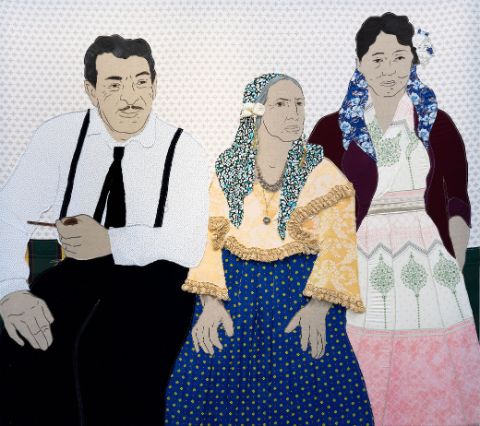Małgorzata Mirga-Tas

Małgorzata Mirga-Tas, Bibi Lubakri Familia (2023). Courtesy Małgorzata Mirga-Tas and Foksal Gallery Foundation, photo: Hendrik Zeitler
The work of Małgorzata Mirga-Tas offers a first-hand representation of Roma culture, portraying it as vibrant and contemporary, while deeply rooted in a rich heritage. Using large-format chromatic textile collages and painting as her primary mediums, the artist captures the history and daily life of Bergitka-Roma communities in her hometown of Czarna Góra and in the broader Podhale and Spisz regions of south-eastern Poland. Inspired by daily interactions and experiences in her home and community, Mirga-Tas’s oeuvre acts as a powerful counterpoint to the stigmatizing stereotypes of Roma people frequently perpetuated by external gazes. In her most recent series of textile collages, the artist brings to life scenes from her family archive, capturing three generations of Mirga women pictured in the familial embrace of daily life in their hometown during the 1960s and 70s, set against the backdrop of the communist regime in Poland. With children on this beautiful sunny day depicts the artist’s grandmother, Józefa Mirga, alongside her daughters Daniusia, Grażyna (Mirga-Tas’s mother), and Stasia (her aunt who assists the artist with her sewing). The textiles and materials she employs are genuine relics of history, having frequently been possessions of or used by the very subjects of her artworks.
Works in the exhibition:
Pasio khier (In front of the house) (2023), acrylics and fabrics
Chavenca ande kada siukar khameskro dziwes (With children on this beautiful sunny day) (2023), acrylics and fabrics
Terne (Youth) (2023), acrylics and fabrics
Phenia (Sister) (2023), acrylics and fabrics
Courtesy of the artist